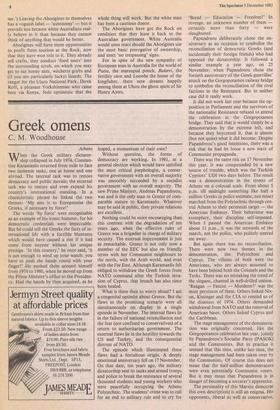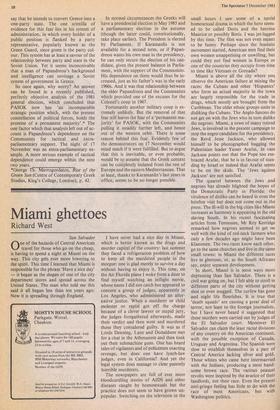Greek omens
C. M. Woodhouse Athens When the Greek military dictator- ship collapsed in July 1974, Constan- tine Karamanlis returned from exile to face two immense tasks, one at home and one abroad. The internal task was to restore democracy and public morale; the external task was to restore and even expand his country's international standing, In a characteristic phrase he linked the two themes: 'My aim is to Europeanise the Greeks, if necessary by force!'
The words 'by force' were recognisable as an example of his ironic humour, for his democratic credentials were impeccable. But he could tell the Greeks the facts of in- ternational life with a forcible bluntness which would have caused a riot if it had come from anyone without his unique prestige. 'In this country,' he once said, 'it is not enough to wind up your watch: you have to push the hands round with your finger!' -He pushed them around himself from 1974 to 1980, when he moved up from the Prime Minister's office to the Presiden- cy. Had the hands by then acquired, as he hoped, a momentum of their own?
Without question, the forms of democracy are working. In 1981, at a general election which would have satisfied the most critical psephologist, a conser- vative government with an overall majority was smoothly succeeded by a socialist government with an overall majority. The new Prime Minister, Andreas Papandreou, was and is the only man in Greece of com- parable stature to Karamanlis. Whatever may be said in public, their private relations are excellent.
Nothing could be more encouraging than this contrast with the degradation of ten years ago, when the effective ruler of Greece was a brigadier in charge of military security. The external improvement is just as remarkable. Greece is not only now a member of the EEC but also on friendly terms with her Communist neighbours to the north, with the Arab world, and even with the Far East. Although Karamanlis felt obliged to withdraw the Greek forces from NATO command after the Turkish inva- sion of Cyprus, that breach has also since been healed.
What is there then to worry about? I am a congenital optimist about Greece. But the flaws in the promising scenario were all simultaneously on display in a single episode in November. The internal flaws lie in the failure of national reconciliation and the fear (not confined to conservatives) of a return to authoritarian government. The external flaws lie in the hostility towards the US and Turkey, and the consequential distrust of NATO.
The episode which illuminated these flaws had a fortuitous origin. A deeply emotional anniversary fell on 17 November, On that date, ten years ago, the military dictatorship sent its tanks and armed troops and police to break the resistance of several thousand students and young workers who were peacefully occupying the Athens Polytechnic. The students' crime was to call for an end to military rule and to cry for `Bread — Education — Freedom!' In revenge, an unknown number of them certainly more than forty — were slaughtered.
Papandreou deliberately chose the an- niversary as an occasion to symbolise the reconciliation of democratic Greeks (and incidentally their foreign friends) who had opposed the dictatorship. It followed a similar example a year ago, on 25 November, when Papandreou chose the fortieth anniversary of the Greek guerrillas' attack on the Gorgopotamos railway bridge to symbolise the reconciliation of the rival factions in the Resistance. But in neither case did it really work.
It did not work last year because the op- position in Parliament and the survivors of the nationalist Resistance refused to attend the celebration at the Gorgopotamos bridge. They said that it would simply be a demonstration by the extreme left, and because they boycotted it, that is almost (but not quite) what it did become. Despite Papandreou's good intentions, there was a risk that he had let loose a new wave of Communist propaganda.
There was the same risk on 17 November this year. It was compounded by a new source of trouble, which was the Turkish Cypriots' UDI two days before. The result was a demonstration in the streets of Athens on a colossal scale. From about 5 p.m. till midnight something like half a million Greeks (a police estimate, not mine) marched from the Polytechnic through cen- tral Athens to their perennial target — the American Embassy. Their behaviour was exemplary, their discipline self-imposed. When I passed the American Embassy about I1 p.m., it was the stewards of the march, not the police, who politely steered me away.
But again there was no reconciliation. There were now two themes in the demonstration, the Polytechnic and Cyprus. The villains of both were the Americans, who are always assumed to have been behind both the Colonels and the Turks. There was no mistaking the trend of the slogans, chanted in well-drilled unison. `Reagan — Fascist — Murderer!' was the most persistent of them. Others linked Nix- on, Kissinger and the CIA to remind us of the disasters of 1974. Others demanded withdrawal from NATO and the removal of American bases. Others linked Cyprus and the Caribbean.
The stage management of the demonstra- tion was originally concerted, like the Gorgopotamos celebration last year, jointly by Papandreou's Socialist Party (PASOK) and the Communists. But in practice it seemed that this time, unlike last time, the stage management had been taken over by the Communists. Of course this does not mean that the half-million demonstrators were even potentially. Communist voters. But it may mean that Papandreou is in danger of becoming a sorcerer's apprentice.
The personality of this Marxist democrat (his own description) is still an enigma. His opponents, liberal as well as conservative, say that he intends to convert Greece into a one-party state. The one scintilla of evidence for this fear lies in his system of administration, in which every holder of a public position is flanked by a party representative, popularly known as the Green Guard, since green is the party col- our. This system has at least a savour of the relationship between party and state in the Soviet Union. Yet it seems inconceivable that a man of Papandreou's background and intelligence can envisage a Soviet system of government in Greece.
So once again, why worry? An answer can be found in a recently published, perfectly objective analysis of the 1981 general election, which concluded that PASOK now has 'an incomparable strategic position which, with the present constellation of political forces, holds the promise of a permanent majority' .* The one factor which that analysis left out of ac- count is Papandreou's dependence on the Communists for tactical and extra- parliamentary support. The night of 17 November was an extra-parliamentary ex- ample. A more serious example of tactical dependence could emerge within the next two years.
*George Th. Mavrogordatos, Rise of the Green Sun (Centre of Contemporary Greek Studies, King's College, London), p. 42.
In normal circumstances the Greeks will have a presidential election in May 1985 and a parliamentary election in the autumn (though the latter could, constitutionally, take place earlier). The President is elected by Parliament. If Karamanlis is not available for a second term, or if Papan- dreou wants his own man in the presidency, he can only secure the election of his can- didate, given the present balance in Parlia- ment, with the support of the Communists. His dependence on them would thus be in- creased, just as his father's was in the early 1960s. And it was that relationship between the elder Papandreou and the Communists which provided one of the excuses for the Colonel's coup in 1967.
Fortunately another military coup is ex- tremely unlikely. But the removal of that fear still leaves the fear of a 'permanent ma- jority' for PASOK, with the Communists pulling it steadily further left, and hence out of the western orbit. There is some reason behind this fear. Evidently few of the demonstrators on 17 November would mind much if it were fulfilled. But to argue that this is inevitable, or even probable, would be to assume that the Greek context can be completely isolated from the rest of Europe and the eastern Mediterranean. That at least, thanks to Karamanlis's last years in office, seems to be no longer possible.















































 Previous page
Previous page